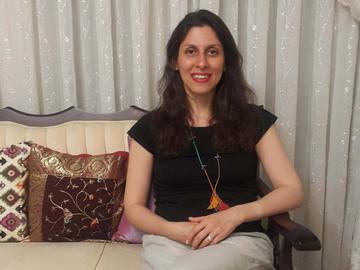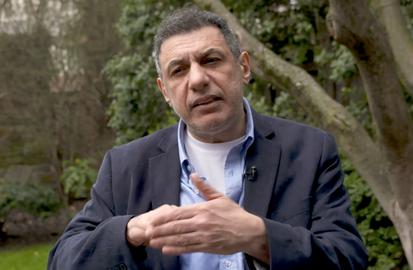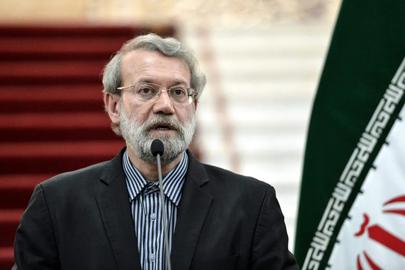These reflections by IranWire’s founder Maziar Bahari was first published on November 27, 2020 after Tehran’s release of imprisoned academic Kylie Moore-Gilbert. This week a Turkish tourist, Bora Omeroglu, became the latest person to be arbitrarily detained while visiting Iran.
Two characteristics define the Islamic Republic: corruption and brutality. It would be wise to remember these words before deciding to travel to Iran.
The expression on the face of Kylie Moore-Gilbert as she was being released said everything we needed to know about her ordeal in Iran. In the minutes before she was preparing to leave Iran, she looked angry, disappointed and very tired. Tired of all the stupid interrogations she had to go through and all the lies she was asked to repeat. She looks exhausted because I’m sure, even until the last minute, her tormenters made sure that she suffered. They let her know they could easily cancel her return home.

The British-Australian scholar was released on Wednesday, November 25, as part of a prisoner swap that saw three Iranian “businessmen” returned to Iran. As they arrived back in Tehran, the three men — in reality, terrorists who were jailed in Thailand after a thwarted bomb plot in 2012 — were warmly greeted by Iranian deputy foreign minister Abbas Araghchi. The three thugs returned as heroes to Iran. Upon their arrival the Iranian diplomats chanted "May This Expedite the Return of the 12th Imam (the Shia Messiah)." Incidentally, these are the same diplomats who insist that Iran has a “normal” regime and must not be treated as a pariah state.
Melbourne University lecturer Moore-Gilbert had traveled to Iran in 2018 under the impression that she was safe. Invited to speak at a conference, Moore-Gilbert had demonstrated respect and fascination for Iran by putting it at the center of her work. She wanted to share this knowledge with colleagues and the world. Instead she was branded an Israeli spy.
How could this have happened? Can people travel to Iran and remain safe? Can foreigners safely go to Iran in a professional capacity or as tourists? Can people trust the Iranian government when they are invited for a conference or to an event? What about dual-national Iranians, people like Iranian-British Nazanin Zaghari-Ratcliffe, who was arrested before returning to the UK after visiting her family in Iran?
“Practically, I think it’s good to remember that most people will be fine, and Iran is a country full of lovely people,” says Richard Ratcliffe, Zaghari-Ratcliffe’s husband, who lives in London. “But if you are one of the unlucky ones, you will need to make your problem one that your own government has to deal with. A government’s interests and the family’s are not the same, whatever the sweet words. It’s not personal. So you have to make it so.”
It might seem insane that academics like Moore-Gilbert or Iranian-French dual national Fariba Adelkhah, whose jobs require them to study Iran and Shia Islam regardless of who is in charge of the government, would ever be the target of persecution in Iran. Many countries provide grants to foreign scholars to study their history and culture, and they regard these researchers as ambassadors for their nations. But academics and those with links to charities have become key targets for the Iranian security apparatus.
Iran’s Supreme Leader Ayatollah Ali Khamenei’s main worry, and what provokes many of these detentions, is nofooz, or “infiltration.” Although there is no actual definition, legal or otherwise, for nofooz, it is a dangerous concept. Two decades ago Iranian security forces regarded blogging and the internet as symbols of infiltration. Dozens of bloggers and journalists were jailed and tortured simply because they were doing their job. Today, studying Iran and introducing new ideas to Iran’s academic and business communities can be regarded as seditious infiltration.
A Dangerous Rivalry
Like other ideological systems, abstract crimes such as “sedition” and “infiltration” are used by different individuals and factions in Iran to arrest, imprison and even kill their rivals. Nizar Zakka, a Lebanese national and resident of the United States, traveled to Iran to speak at a conference about women and technology in 2015. He was personally invited by Shahindokht Molaverdi, the vice president for women’s affairs at the time. Zakka had previously visited Iran three times on the invitation of the government. “I was going to Iran with a lot of good energy and will,” says Zakka “It was really exciting; it was a market of 90 million.”
Zakka soon became the victim of a rivalry between the Revolutionary Guards and the government of President Hassan Rouhani. When he was preparing to leave the country, he was stopped on the way to the airport. He was pulled over, arrested, and told that he was now under the authorities’ control. “I thought the Revolutionary Guards wanted openness, wanted to make a deal, but they wanted to do it themselves,” says Zakka.
Zakka spent four years in prison in Iran. He suffered daily torture and humiliation. He was blindfolded, beaten, and forced into a constant state of disorientation and confusion. “It becomes so hard because you never know when you’re going to be hit,” he says. “You don’t sleep at night.”
A year after his release Zakka contacted Mrs. Molaverdi. Zakka simply wanted to know what happened and why, as his host, she did not she speak up for him and protect him. She said she had no power to do anything about it. “Your case was in the hands of the judicial and security apparatus. We really didn’t know what was happening. We did not know such a thing would happen,” said Molaverdi in a phone conversation with Zakka. I made a film about Zakka’s experience this year and I’m still haunted by the calm callousness of Molaverdi, who didn’t even have the decency to apologize to Nizar Zakka.
What Zakka’s experience (and others) make clear is that every person who visits Iran must understand that she or he can be a victim of this internal rivalry between different factions of the Iranian regime, especially between the Guards and the official government of the country. The Guards aim to put political pressure on other factions and to use foreign hostages as bargaining chips.
Threat of Becoming Hostage in Iran
Kylie Moore-Gilbert was freed after what the Australian foreign ministry described as "diplomatic engagement with the Iranian government” – their code for exchanging the Australian academic for three terrorists.
Before she left Iran, Dr. Moore-Gilbert said, “I have only respect, love and admiration for the great nation of Iran and the warm-hearted, generous and brave people of Iran.”
Most people who have been to Iran are overwhelmed by the Iranian people’s generosity and warm welcome. Thousands of Western tourists visit Iran every year and they return home safely. But every foreign visitor must think about the experiences of others who have traveled to Iran. It is also vital that foreign governments warn their citizens about the dangers. The German government recently warned about unnecessary travel to Iran. “Refusals upon entry and exit also occur without any reasons being known,” the warning reads. “Consular support options are considerably limited or even impossible.”
Iran’s foreign ministry protested against the German warning, but the families of those perishing in Iranian jails know it is wise advice. Richard and Nazanin’s six-year-old old daughter Gabriella is waiting every day for her mother to return home. After Zaghari-Ratcliffe’s arrest, Gabriella stayed with her grandparents in Tehran. Knowing she was nearby gave Zaghari-Ratcliffe strength and the motivation to stay strong and keep fighting. But in October 2019, Gabriella returned to the UK to live with her father after Nazanin and Richard decided she must start school.
“Yesterday morning I thought it was perfectly possible Nazanin could be home by Christmas, or suddenly sentenced to a number of more years’ imprisonment, or nothing could happen for a while to come,” Richard Ratcliffe said from their home in northwest London the day after Moore-Gilbert's release. “That remains true today: all three possibilities are quite plausible. We just have to live it one day at a time. And probably be ready to battle for a while to come, while still secretly hoping that we are over-preparing.”
Four Pieces of Advice for Prospective Travelers
I was arrested and tortured in 2009 when I was working as Newsweek magazine’s correspondent in Iran. I know what it means to be woken up in the middle of the night, taken to a torture room to be beaten and humiliated. So, I beg every government and anyone who thinks about going to Iran consider the following four points.
1- Governments should give clear advice. Their travel advisories are written in diplomatic and over-cautious language that many ordinary citizens do not take seriously. Foreign ministries must have a more robust presence on social media, in Iranian media in the diaspora and in Iranian studies faculties in the West.
2- Western businesses operating in Iran must be warned about potential threats to their foreign and Iranian employees and contractors. These threats come from different organizations in Iran, including but not limited to the Revolutionary Guards, the Ministry of Intelligence, the judiciary and various foundations in charge of confiscated properties.
3- Businessmen and women who trade with Iran and travel there must be warned before they go. They need to hear about cases of people being arrested and jailed. And they must be warned that something similar can happen to them. Governments must make sure that their citizens are aware of the risks. Since trading with Iran is only limited to hundreds and not thousands of companies, this should not be a burdensome task for government officials. It is much easier to prevent arrests than it is to negotiate the release of hostages.
4- Dual national Iranians such as myself and others who have been released in recent years must be consulted and their stories told in order to inform people who take the decision to travel to Iran. They must be encouraged to think carefully before they book flights to Tehran’s Imam Khomeini Airport.
I was lucky to be able to survive the ordeal because of the amazing campaign launched by my family and colleagues. I wish Dr. Moore-Gilbert a calm return to a normal life in Australia or wherever she chooses to settle. Others who may think about traveling to Iran must remember these two words before buying their tickets: “corruption and brutality.”
Related coverage:
The Treacherous Host: An IranWire FIlm
Nazanin Returned to Parents’ Home as Trial Adjourned
visit the accountability section
In this section of Iran Wire, you can contact the officials and launch your campaign for various problems



























comments